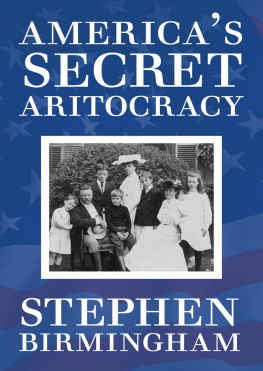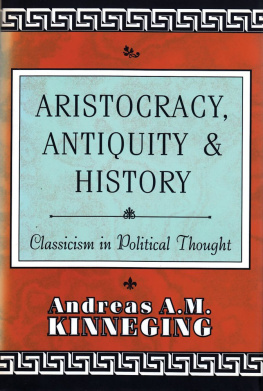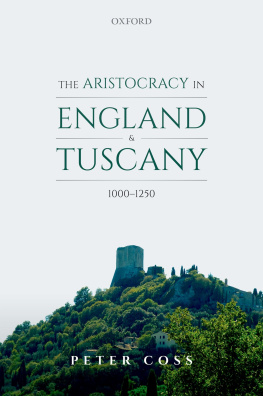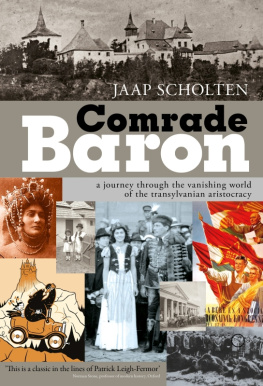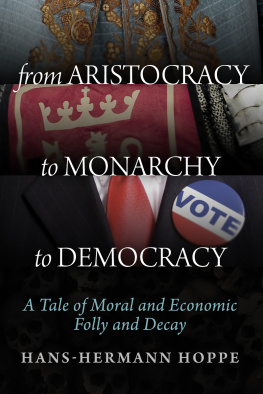ARISTOCRACY AND ITS ENEMIES IN THE AGE OF REVOLUTION
ARISTOCRACY AND ITS ENEMIES IN THE AGE OF REVOLUTION
WILLIAM DOYLE


Great Clarendon Street, Oxford OX2 6DP
Oxford University Press is a department of the University of Oxford.
It furthers the Universitys objective of excellence in research, scholarship,
and education by publishing worldwide in
Oxford New York
Auckland Cape Town Dar es Salaam Hong Kong Karachi
Kuala Lumpur Madrid Melbourne Mexico City Nairobi
New Delhi Shanghai Taipei Toronto
With offices in
Argentina Austria Brazil Chile Czech Republic France Greece
Guatemala Hungary Italy Japan Poland Portugal Singapore
South Korea Switzerland Thailand Turkey Ukraine Vietnam
Oxford is a registered trade mark of Oxford University Press
in the UK and in certain other countries
Published in the United States
by Oxford University Press Inc., New York
William Doyle 2009
The moral rights of the author have been asserted
Database right Oxford University Press (maker)
First published 2009
All rights reserved. No part of this publication may be reproduced,
stored in a retrieval system, or transmitted, in any form or by any means,
without the prior permission in writing of Oxford University Press,
or as expressly permitted by law, or under terms agreed with the appropriate
reprographics rights organization. Enquiries concerning reproduction
outside the scope of the above should be sent to the Rights Department,
Oxford University Press, at the address above
You must not circulate this book in any other binding or cover
and you must impose the same condition on any acquirer
British Library Cataloguing in Publication Data
Data available
Library of Congress Cataloging in Publication Data
Doyle, William, 1942
Aristocracy and its enemies in the age of revolution / by William Doyle.
p. cm.
Includes bibliographical references and index.
ISBN 9780199559855 (alk. paper)
1. FranceHistoryRevolution, 17891799Social aspects. 2. Aristocracy (Political
science)FranceHistory18th century. 3. NobilityFranceHistory18th century.
4. Aristocracy (Political science)FrancePublic opinionHistory18th century.
5. NobilityFrancePublic opinionHistory18th century. 6. FranceSocial
conditions18th century. 7. FranceIntellectual life18th century. 8. Public
opinionFranceHistory18th century. I. Title.
DC158.8.D69 2009
944.04dc22
2008053060
Typeset by Laserwords Private Limited, Chennai, India
Printed in Great Britain
on acid-free paper by
Clays Ltd., St Ives plc
ISBN 9780199559855
1 3 5 7 9 10 8 6 4 2
Preface
The longest chapter in this book is about the Society of the Cincinnati. As originally conceived, nearly forty years ago, it was to have been a book in itself. But there was always something else to do, and as the years slipped by it came to seem like a project that would have to wait until retirement. Then, with retirement still some way off, I was unexpectedly invited to write my dream book, and realized that this was the moment. Sabbatical leave was due, and I was fortunate enough to spend some of it at the Institute for Advanced Study in Princeton. There I researched the Cincinnati in depth, and wrote that chapter. I also came to recognize that there was not enough new material to merit a whole book.
The controversy over the Cincinnati, however, was always chiefly significant as an episode in a much bigger story. The challenge to aristocratic rule in the world of Europe and its colonies was a development of world-historical significance, and one seldom seriously studied for its own sake. I decided, therefore, to embed my findings on the Cincinnati in a wider study of the most fundamental part of that challenge. Thus it grew into a book about the attempt of the French revolutionaries to abolish nobility entirely, comprising both its background and its consequences. What happened in America and France does not of course exhaust the subject. The challenge transcended frontiers and resonated in every corner of the European world. But the initial example came from the revolutionaries of America and France, and that is where the main focus of the book lies.
Innumerable friends and colleagues have helped me throughout its long and unpredictable evolution. Initial interest in the Cincinnati was encouraged by the late George C. Rogers, Jr, pre-eminent historian in his day of South Carolina. The suggestion of writing the dream book came from Tony Morris, whose repeated involvement over the years in the history I have written has marked its whole course. The crucial sabbatical was engineered by Ian Wei; and Jonathan Israel and the Institute Members at Princeton in 2004 proved a rare stimulus. The staff of the Institute Library worked wonders in procuring rare books and documents. Nor could the Cincinnati chapter have been written so easily without access to the magnificent resources of the Firestone Library at Princeton University. Earlier versions of parts of the book were tested by debate in the seminars of David Bell at Johns Hopkins, Don Sutherland at the University of Maryland, Jean-Pierre Poussou at the Sorbonne (Paris IV), the Early Modern seminars at Oxford and at the Institute of Historical Research, London, and the history research seminars at the universities of Bristol and Sussex. Ploughing a parallel furrow, Hamish Scott has also been a never-failing source of ideas, suggestions, and opportunities.
Another project, still hopefully far from completion, passes its fortieth anniversary this year. Over that time, Christine has been my frankest critic and my most unfailing support. Nothing can rob her of the most affectionate dedication yet.
WD
June 2008
Abbreviations
| AAE | Archives des Affaires trangres |
| AmHR | American Historical Review |
| AP | Archives parlementaires de 1787 1860: Srie I, ed. J. Madival and E. Laurent, 90 vols. (Paris 1879 ) |
| Bachaumont | [L. Petit de Bachaumont], Mmoires secrts pour servir lhistoire de la rpublique des lettres en France depuis MDCCLXII jusqu nos jours, 36 vols. (London 17809) |
| Best. | T. Besterman (ed.), Voltaires Correspondence and Related Documents, Definitive Edition, 50 vols., being vols. 85135 of Complete Works of Voltaire (Geneva, Banbury, and Oxford, 1968 ) |
| BL | British Library, London |
| BN | Bibliothque Nationale, Paris |
| GWC | Edgar Ansell Hume (ed.), General Washingtons Correspondence concerning the Society of the Cincinnati (Baltimore, 1941) |
| Jefferson Papers | Julian P. Boyd (ed.), The Papers of Thomas Jefferson (Princeton, 1950 ) |
| JMH | Journal of Modern History |
| Moniteur | L. Gallois (ed.), Rimpression de lAncien Moniteur, 29 vols. (Paris, 18405) |
| SVEC | Studies on Voltaire and the Eighteenth Century |
Introduction
Jean-Baptiste Cloots was a Baron. He liked to call himself Baron of Gnadenthal, or Val-de-Grce in his preferred language, French. His family had been noble, he claimed, for more than 450 years, and had produced barons for five generations. Most of this was untrue.
Next page







